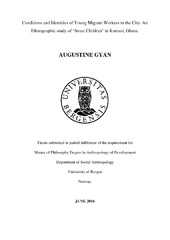| dc.description.abstract | Abstract Earlier studies on streetism' or street children' have often focused exclusively on the economic causes and impacts. Economic considerations have often assumed a more prominent position in explaining why children decide to leave their family home to seek for a livelihood on the street, while socio-cultural dimensions recede to the background. An approach uncovering the life-worlds of children involved in streetism, their socio-cultural and economic backgrounds and diverse combination of motivations that drive children with certain identities into the practice, seldom feature prominently in anthropological research. A research approach that illuminates the concept of childhood' in particular sociocultural contexts provide promising avenues for a rich analysis of why particular children are often involved in streetism. Drawing on a six-month long ethnographic fieldwork, my study examines the life-worlds of street children in Ghana's second largest city, Kumasi. The extensive ethnographic approach helped me to follow up on the daily routines and life-worlds of children during the six month long fieldwork, a task which would have been impossible to achieve if I had done only short term observations and interviews. Furthermore, my study interrogates the concept of childhood' in Ghana, explores the socio-economic identity of street children in Kumasi, and then illuminates diverse motivations that drive the children to the street'. The term street' is often used to denote stays outside of parental homes or where the lives of children are not properly supervised and monitored. I used the findings of my study to demonstrate the complexities involved regarding this conventional definition of who can be considered as a street child. In this thesis, I argue that a complex combination of factors (both social and economic) operate in tandem to explain why children from certain socio-economic and cultural backgrounds become susceptible to situations that compels them to make a living outside of their parental homes, or places of abode without proper supervision or social upbringing. In addition, my study elucidates on the numerous economic activities the children often engage in on the street. Using James and Prout (1997) Social Theory of Childhood, I demonstrate in the thesis that street children should not be seen as passive, incomplete and incompetent but rather active in terms of the determination and construction of their own lives vis-a-vis those around them and the society at large. Also, the life-worlds of the children have been explored using Granovetter's Social Network Theory (1983). Using these two broad theoretical perspectives, I argue that street children in Kumasi have created their own institutions that ensure their survival on the street. Also, the great majority of street children are girls. In addition to this, I show that migration has led to changes in economic roles by girls as these girls are the breadwinners and substantially contribute to the survival of their siblings back home, while the boys primarily provide for themselves. Moreover, I show in this thesis that, social factors often precede economic ones for being on the street and that the family' serves as the root cause to the streetism phenomenon. Finally, I argue that some of the children migrate to the street for prestige. The euphoria attached to travelling to the city to also be labelled as have... | en_US |
